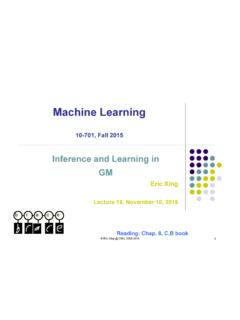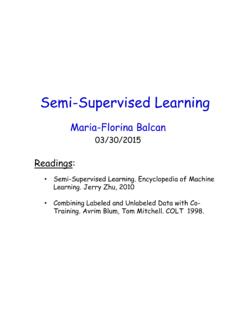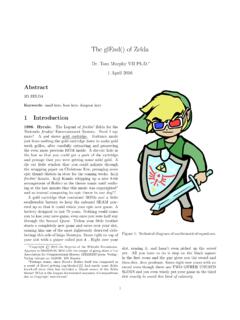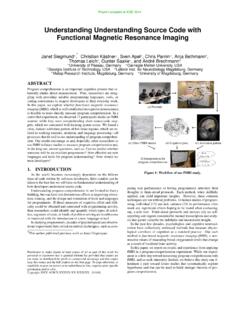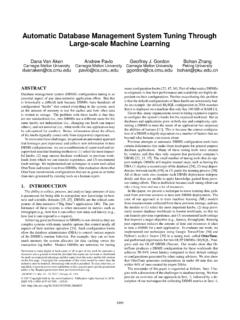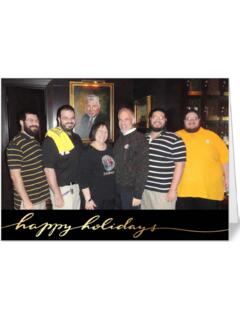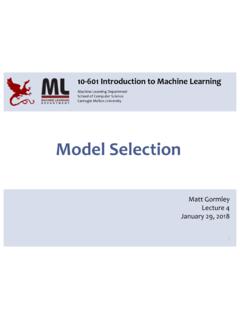Transcription of Women@IT: Graduate Education, The Next Big Thing
1 Wome@IT The Fifth Grace Hopper Celebration: Making History, celebrating the impact of women past, present, and future on computing. Women@IT: Graduate Education, The Next Big Thing Anastassia Ailamaki, Lenore Blum, M. Bernardine Dias, Carol Frieze, Manuela Veloso, and PhD Students from Robotics, Language Technologies and Computer Science School of Computer Science Carnegie Mellon University The next generation of IT professionals will be drawn from the upcoming generations of IT students. The future of this field, including its potential to transform society, will be shaped by these students. Thus, it is critical to attract and promote students who will be future leaders and visionaries and bring diverse perspectives to the table.
2 The theme of our proposed session is: increasing the pool of women students in Graduate CS/IT programs and positioning them to become future university CS/IT faculty and leaders in the field. Top tier schools of computer science have undergraduate populations hovering in the range of 10% to 20% for women. At the Graduate level, data gathered by the Taulbee Survey (2000-2001) from 173 granting departments show women represent 19% of students in computer science and computer engineering (16% Graduate with PhDs). At the faculty level, only 15% of the new tenure-track faculty are female and at the full professor level, only 8% are female.
3 In this three part panel session, we plan to present a program of strategies for recruitment, retention and community building at the Graduate level. This program is designed and implemented by faculty and Graduate students from Women@SCS, ( ) a dynamic community of women in computing at Carnegie Mellon University (CMU). We will focus in particular on our Graduate Outreach Roadshow project, which we hope will be a model for other groups looking to engage in similar activities. We will encourage discussion about the overall feasibility, effectiveness, and appropriateness of this and other strategies for involving women in computer science at the Graduate level and beyond.
4 Session Length: 1 hrs Audience: This panel will be of interest to anyone working to increase the participation of women in computer science, especially at the Graduate level. The Graduate Outreach Roadshow, will be particularly interesting to current undergraduates and to faculty and Graduate students looking to create a similar program of their own. (Session attendees will be given a copy of our Roadshow brochure that is distributed at our presentations.) PROGRAM: Part 1 of our session will explain our goals and a description of the new Women@IT enterprise. Part 2 will consist of a demonstration of the Graduate Outreach Roadshow.
5 Part 3 will comprise a panel discussion on the dynamics, issues and challenges involved. PART 1. Women@IT: Introduction, Strategies for Recruitment, Retention and Community Building at the Graduate Level In the first part of our program we will introduce the components of the Women@IT enterprise. These include (but are not limited to): Implementing outreach strategies to undergraduate college faculty and students, Wome@IT Encouraging applications from students who might not have extensive prior CS experience but who want to integrate CS/IT with their strengths in other disciplines, Providing first year fellowships for high potential non-traditional students to enable them to immerse themselves in CS/IT along with an initial buffer year for such students (with tailored courses and appropriate advising)
6 , Extending the role of Women@SCS to Women@IT for current and future students by providing additional professional training and experiences targeted to enhance potential careers in academia and as leaders in the profession along with community building (social, academic and professional), IT summer Workshops for college faculty. PART 2. The Graduate Outreach Roadshow In this part of the program our Graduate students will present one of our newest and most exciting strategies -- the Graduate Outreach Roadshow. This presentation is an extension of the successful Outreach Roadshows developed by Women@SCS initially for middle school children in the Spring 2002.
7 Since then, teams of Graduate and undergraduate students have demonstrated the Roadshow to local middle and high school teachers and students, and presented the Roadshow at the 2003 Richard Tapia Celebration of Diversity in Computing. All versions of the Roadshow share these goals: to increase role modeling and the visibility of young women in computer science, to challenge the traditional stereotypes of what/who computer scientists are, to show the breadth of fields that computer science can encompass, to provide an interesting and enjoyable learning experience, to provide leadership/mentoring opportunities for our young women computer science students.
8 The Graduate Roadshow adds a scholarly and technically sophisticated dimension to the presentation to meet the needs of presenters and audience. It is delivered by Graduate students from different disciplines of computer science and is designed for an audience of undergraduate juniors and seniors. It consists of four talks (approx. 15 mins each) given by Graduate students about their background, research areas, and motivations for going to Graduate school, followed by a question and answer sessions for students who have specific questions about the application process and Graduate school experience. The Graduate Outreach Roadshow serves several purposes: to make undergraduates aware of the exciting research opportunities available for women in Graduate school, to provide a forum for Graduate women to gain speaking and leadership experience, to inform undergraduates of scholarships and funding opportunities for financing Graduate education, and to reach out to outstanding students from fields outside of computer science, for example, mathematics, biology, physics or psychology, who may want to integrate their expertise with computing-related disciplines.
9 We believe that the Graduate Roadshow provides undergraduate women with strong Graduate -student role-models and makes the Graduate school application process less intimidating; it is a useful supplement to Graduate school counseling that undergraduate students have available at their home university. PART 3. Panel Discussion: The final part of our program will consist of a panel of faculty and Graduate students who will discuss the dynamics, issues and challenges involved in the Women@IT enterprsie. They will also answer questions and comments. Wome@IT BIOGRAPHIES Program Moderator: Professor Lenore Blum Speakers (Part 1): Lenore Blum and M.
10 Bernardine Dias Roadshow (Part 2): Introduction by Carol Frieze, Director Women@SCS; Roadshow Presentation by PhD students Gita Sukthankar, Stefanie Tomko, Cristen Torrey, Xuejing Chen Panelists (Part 3): Faculty: Manuela Veloso, Natassa Ailamaki; PhD students: Ariadna Font Llitjos, Alison Alvarez. Anastassia (Natassa) Ailamaki is an Assistant Professor in the Computer Science department. She received a degree in Computer Engineering (1990) from the Polytechnic School of the University of Patra, Greece, degrees from the Technical University of Crete, Greece and from the University of Rochester, NY, and a in Computer Science from the University of Wisconsin-Madison.

